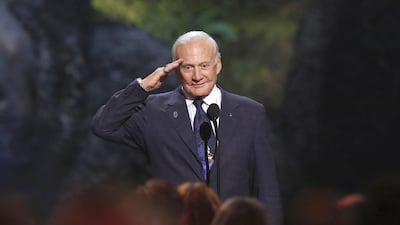A possible European Union investigation into Etihad Airways’ growing investments in the region’s airlines and the question of how to produce the next generation of aerospace workers are the backdrop to an international gathering of industry executives in the capital this week.
The astronaut Buzz Aldrin, the chief executives of Lockheed Martin and the European carriers KLM and Turkish Airlines will line up next to Etihad's chief executive and the head of Mubadala's aerospace division at the Abu Dhabi Global Aerospace Summit today to address challenges that face the industry.
The summit, which takes place every two years, will address topics such as increasing profit margins, encouraging investment, implementing effective regulations, and finding a qualified workforce.
A spokesman for Siim Kallas, the EU commissioner for transport policy, said on Friday that the commission was looking at a number of non-EU investments in European airlines, including Etihad’s stake in Air Berlin. The commission is also watching Etihad’s continuing talks over a possible investment in Alitalia.
More than 1,000 senior executives are expected to be at the summit in the capital.
“The summit is a think tank platform for the industry,” said Homaid Al Shemmari, the chief executive of aerospace and engineering services at Mubadala, the Abu Dhabi government
investment and development company. “It made sense for us to invite all of these key players here and talk about concerns of this industry, its growth and its challenges.
“There’s a paramount shift in this industry from the old West to the emerging East. We are here in the Middle East at the heart of this convergent and change of power.”
Expansion of Arabian Gulf carriers such as Etihad, Emirates Airline and Qatar Airways is gradually shifting the future of air travel to the region. The strategic location of Dubai and Abu Dhabi is another great advantage, where almost 80 per cent of the world's population lies within eight to 10 hours' flying time.
Known as “the big three” – the Gulf airlines made multibillion dollar purchases of aircraft and engines at Dubai’s Airshow in November.
But unlike the Dubai Airshow, the Global Aerospace summit will not produce commercial deals.
“This is not an air show. This is not a platform for people to come and sell their products or market their products or talk about major or mega deals,” said Mr Al Shemmari.
Since 2007, the UAE has realised the importance of developing its aerospace industry. Investing in aerospace also fits into Abu Dhabi’s 2030 vision to diversify its economy into other sectors and reduce the reliance on oil and create skilled jobs for UAE nationals.
“Mubadala still believes aerospace, defence services and communications are three of the strongest sectors we have. We are very bullish about them,” said Mr Al Shemmari.
“We still look very favourably at international investments and to also increase our investments.”
Strata Manufacturing, Mubadala’s advanced composite aerostructures manufacturing plant in Al Ain, in November won deals from Airbus and Boeing worth US$5 billion to manufacture airplane parts.
James Hogan, the president and CEO of Etihad Airways said: “The Global Aerospace Summit is a great opportunity to share ideas, experience and thinking with leaders from across the industry,”
“Ten years ago, it [Abu Dhabi] was only just launching its national airline. Today, the emirate has become a vibrant centre for many strands of the aviation and aerospace sectors.”
selgazzar@thenational.ae
Follow us on Twitter @Ind_Insights

